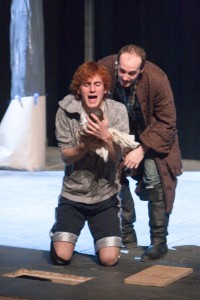Ever wonder what today’s international corporations have in common with 18th-century English working conditions? Ithaca College’s production of “Coram Boy” unveils the answer by drawing connections between a socially unjust past and present day labor practices.

Adapted by Helen Edmundson from the award-winning children’s novel by Jamila Gavin, Ithaca College Theatre’s rendition of “Coram Boy” illuminates the hidden secrets of the working class in the Georgian era of industrialized England and connects workers’ struggles to modern day. With its dark and bloody backdrop of infant murders and child slavery, the play reveals one boy’s passion for George Frideric Handel’s music and his watchful protection of an orphaned slave boy.
The characters live in a society where the shift toward industrialization has caused mass migration and exploitation of the poor. In order to create the inhumane and dark world of the play, senior Erin Coen, assistant director, said her job is to help sculpt the actors to convey the play’s sensitive nature.
“There’s some pretty shocking content in the play,” she said. “This story is so beyond what we consider our reality in modern day. So it’s the kind of play where you watch and say, ‘That was really interesting, but how does it connect to my everyday life?’”
To answer this question, Coen said the directors work with the dramaturge to provide the actors with figures and tools to help them believably recreate the time period and connect the audience to the play’s content.
Sophomore Patrick Mazzella, who plays the lead role of Meshak, the mentally damaged and mute son of Otis, said the musical component of the show helps portray the main plot along with the characters’ personal stories.
Meshak seeks refuge from the cruel reality of the world in his affinity for God and the angels. The cathedral is his escape from the harsh treatment he faces from his abusive father. In this sense, Mazzella said the music students infuse the play and bring it to the next level.
“It’s a different atmosphere when the music students are there than when it’s just us working on scenes,” he said. “When the music students are there the whole show just comes together and it’s really just a spectacular place to be.”
With a complete score, the full choir made up of mostly music students amplifies the theatrical experience. Coen said musical selections by Handel support the play’s story line, and the female musical theater majors’ strong training enables them to execute the required vocal style for their youthful roles.
“They have to learn how to sing like choirboys,” she said. “It’s a very pure, clear tone with no vibrato.”
In addition to musical support, Mazzella said he needed additional resources to develop his tormented character. He said it was a challenge to embody Meshak without having any personal exposure to his troubled reality.
“The hardest part is that he lives in a world that doesn’t give him a chance,” Mazzella said. “I guess the hardest part is trying to understand the circumstances he’s trying to live in. They’re just brutal and harsh and not humane.”
To illuminate the play’s social justice aspect, senior dramaturge Emily Viterise said she shows actors the connection between slavery of the past and present during the rehearsal period. She said the play’s program will include logos of companies that still practice child labor, showing the audience this continuing issue.
“It’s a very interesting topic to bring a new, modern day element into a historic show, and it’s a way to bring people in and have this new information on top of history,” she said.
Coen said the ensemble focuses on each component to emphasize the severity of child slavery and exploitation.
“Everything helps tell the story, from the costume to the set, and the lights and sound help enrich that,” she said.
With more than 60 scenes and locations, the set incorporates everything from the vastness of the cathedral to the looming feel of the forest trees. Coen said having multiple sets was a challenge when planning scene changes. She said the cinematic feel of the script called for her to make the changes as seamless as possible.
“We wanted to keep true to the world of the play, so we have the servants move the scenery,” Coen said. “This is such a rich world that play takes place in that you don’t want to just take the audience out of that mind-set.”
The Georgian costuming is also true to the historic era. Coen said it helps illustrate the characters’ social classes. From aristocrats adorned with lush collars and wide-hipped ladies in long gowns to the poor “rag people” wearing earthy tones, there are characters from all walks of life.
Coen said the multifaceted nature makes producing “Coram Boy” a challenge and is the main reason why many other schools do not perform it.
“As we began the process, it seemed a lot bigger than we thought it would, but we’ve really risen to meet that challenge and embraced it,” Coen said.
“Coram Boy” opens Thursday, with a preview Tuesday, and runs through April 3 in the Hoerner Theater. Tickets are $5.50 to $11.





